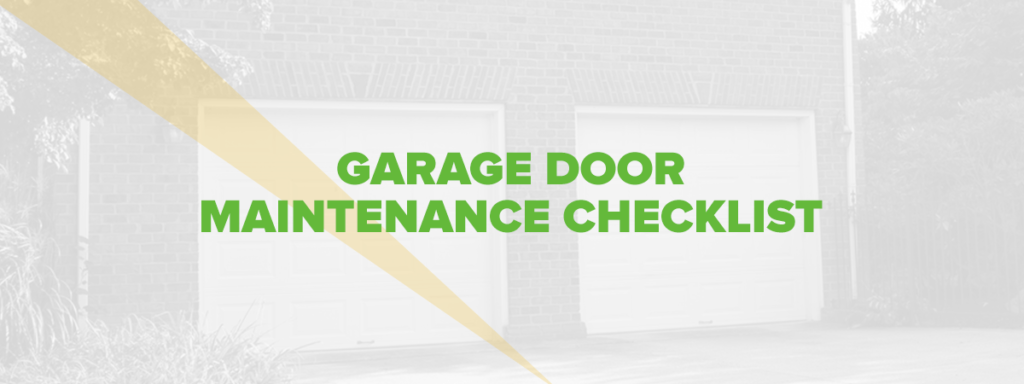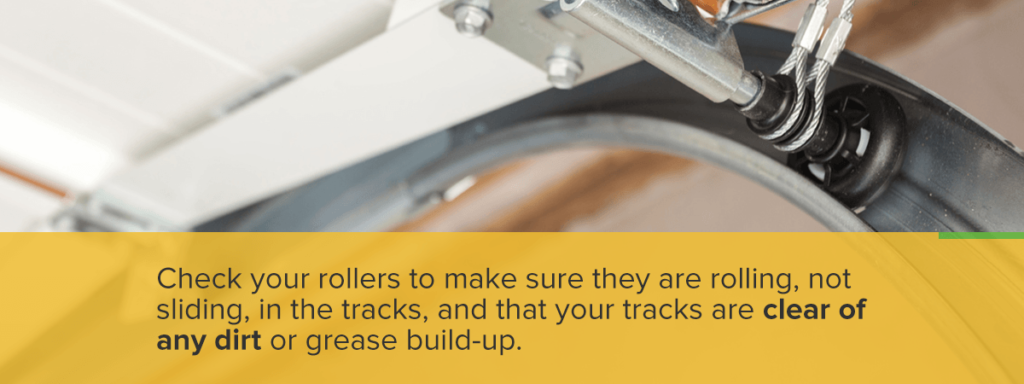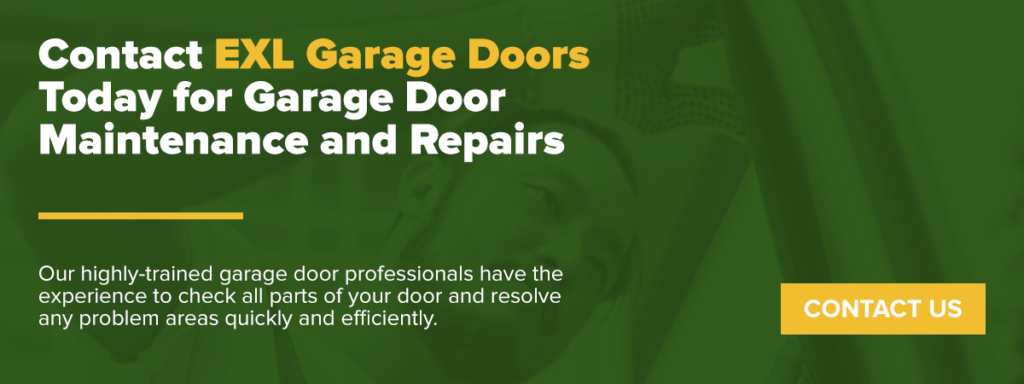
Like many homeowners today with garages, you may open and close your garage numerous times a day. You may not realize anything is wrong with your garage until something doesn’t work correctly or your garage makes an odd sound. However, it’s crucial to take preventative measures when it comes to your garage door — especially if you use it heavily. One way to make sure your garage door is in great shape is to keep up with regular maintenance. Trust professionals to perform garage door inspections and maintenance at least a few times a year, as they are more likely to catch anything wrong with your garage door and can fix it before it causes any more damage. In between professional maintenance visits, you can go through this garage door maintenance checklist to keep an eye on the different parts of your garage door.
Spring System
Broken garage door springs are one of the most common garage door issues. When you look at your garage door, there are usually two torsion springs above the door and extension springs on the side. These torsion springs are super strong pieces of metal that are tightly wound, creating potential energy that powers the springs to open and close your garage door when using the opener. The garage door opener acts to wind or unwind the springs for your garage door to open and close. Although these springs are designed to last about 10 years, all springs eventually wear out. Sometimes your garage may make a loud sound when springs no longer work, but sometimes your garage will not function correctly, have a hard time trying to close or open or stop working altogether when your springs break.
Since springs contain potential energy, you could severely hurt yourself if you attempt to replace your garage door springs alone. You must contact a professional garage door technician, who will arrive with the necessary tools and parts to repair the springs safely. However, just because a professional should perform replacement and maintenance doesn’t mean you can’t inspect springs as part of your regular garage door maintenance. Look for any visibly worn out, fragile or rusted springs and contact a professional if any look broken or like they’re about to break. You may be able to solve minor issues by applying lubricant.
If you’re unsure of the condition of your springs, you can do a garage door balance test. First, disconnect your door from the garage door opener, then manually lift your door. If you can’t open the door manually, call a professional at once. If it moves smoothly up and down, try leaving it half way. A well-balanced door will stay in place. If there is any movement, your door will likely fall down because the springs have lost tension. Never attempt to adjust the springs yourself and call a professional instead.
Hinges
Although your garage door hinges are small, they are necessary to ensure your garage door can still open and close. If your hinges break and go undetected, it could lead to more severe damage, such as messing up your door’s guide tracks or damaging panels, which could eventually lead to an entire door replacement. Wobbly or missing screws may be the first sign that you need to replace your hinges. If screws are loose or missing, the metal plate they were in may have deteriorated. Sometimes using a nut and bolt to replace the screw provides a temporary fix. You should regularly check to make sure your screws are tight, that nothing is bent or twisted and that the lifting cable is attached to the hinges at the bottom of the door correctly to ensure your door is in excellent condition.
You should also check regularly for any rust or corrosion when you inspect your hinges. You may opt to use an oil lubricant on your hinges and other moving parts on your door to help prevent corrosion and other wear. Consult with a garage door professional to learn how to lubricate your garage door and determine which lubricant you should use for your specific model. If your hinges go beyond minor issues and you suspect they need to be replaced, you should also refer to a professional for help as soon as possible. It’s a lot easier to have someone fix your hinges than replace your entire garage door. Keeping up with regular maintenance will ensure you know how your garage door is holding up, and know when it needs help from a professional.
Rollers
Your garage door rollers are crucial to smooth operation, opening and closing as your garage door should be. However, if you notice your garage door has gotten extra noisy when it opens and closes, your rollers are likely starting to misalign or aren’t moving correctly along the tracks. Sometimes rollers can be fixed with track grease, which helps the door open and close smoothly again and minimizes some of the noise, but other times rollers may need to be replaced. If your rollers don’t have enough lubrication, this could also lead to the garage door shaking, roller bearing failure and the loud opening and closing.

Check your rollers to make sure they are rolling, not sliding, in the tracks, and that your tracks are clear of any dirt or grease build-up. If your garage door tracks are filthy, your rollers may not move properly, so clean them regularly. Rollers may also go off of the tracks if the tracks aren’t anchored against the wall tightly, so check the brackets to make sure they are tight and that the tracks are where they should be. Be cautious of accidentally bumping your garage door with your car or any other large object, as this could also cause tracks to become misaligned and cause problems with rollers. If you keep up with maintenance and still suspect your rollers need to be replaced, contact a professional for help.
Lifting Cables
Garage door lifting cables are incredibly durable cables that allow your door to open and close by controlling the torsion springs. The cables prevent the springs from recoiling, so the springs can continue to do their job correctly to open and close the garage door safely. However, cables won’t last forever and may lose tension over time, so you must get them replaced when they’re showing signs of the end. How will you know when the cables are ready to be replaced? Usually, you simply have to look at your garage door. If your cable is rusted or frayed, you can tell by looking at it.
Additionally, if you notice any loud noises like screeching, rattling or grating, delayed opening and closing or not opening and closing at all, it could indicate a problem with your garage door cables. You should make sure your cables wind around the reel at the top of the vertical track and are functioning correctly. If your cables need to be replaced, make sure you trust a garage door professional to get the job done. If you attempt to replace cables yourself, you could be seriously injured since the spring and cable mechanism is fragile yet extremely powerful. You could also accidentally damage your garage door system, which could void your warranty.
Garage Door Opener and Sensors
If you’re having issues with your garage door opener and sensors, you could either repair your garage door opener or replace it altogether. However, it’s best to seek professional assistance when it comes to a faulty garage door opener so they can help determine which option would be best for you. If your garage door opener is 10 years old or older, a replacement is usually the best option, even if it could be fixed with a repair. Piling up repairs instead of replacing the opener is a temporary fix that will only lead to more repairs. Plus, new technologies are always emerging to take advantage of, so don’t get stuck with an outdated system.
To make the most of your garage door opener, however, make sure you regularly change the batteries in your remote. You should also make sure your garage door opener is compatible with a backup battery to use if the power goes out. If the power goes out and you don’t have a backup battery, you can’t open your garage door with your opener and would have to disconnect it from your opener and manually lift it. To test your garage door sensors, you could also conduct a reversal test. Start with an open garage door and put a 2-by-4 flat on the ground in the center of the door. Then, hit your opener to close the door. If the door hits the wood and doesn’t reverse immediately, you need to contact a professional for maintenance.
Contact EXL Garage Doors Today for Garage Door Maintenance and Repairs

Whether your garage door needs some routine professional maintenance to ensure everything looks how it should or you suspect something is broken and needs to be repaired or replaced, don’t keep putting it off. EXL Garage Doors has served customers throughout middle Tennessee for more than 20 years and can help you find the best solution to prolong the life of your garage door. Our highly-trained garage door professionals have the experience to check all parts of your door and identify and resolve any problem areas quickly and efficiently. Don’t wait, contact us and request a service today to keep your garage door in its best possible condition.
